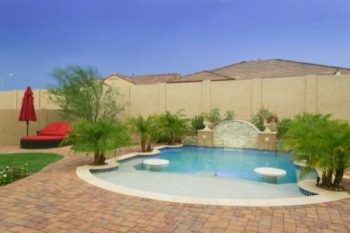Salt Water Swimming Pools – Chlorine Free
 One of the nicest things about swimming in the ocean is how soft the water feels, especially in the warmer latitudes. There’s no chlorine smell or sting on your skin either. Swimming pools, hot tubs, and spas can also be filled and operated with salt water, using a slightly different technique to sanitize the water.
One of the nicest things about swimming in the ocean is how soft the water feels, especially in the warmer latitudes. There’s no chlorine smell or sting on your skin either. Swimming pools, hot tubs, and spas can also be filled and operated with salt water, using a slightly different technique to sanitize the water.
With a saltwater pool, there is the added advantage of not having to deal with harsh chemicals like chlorine or bromine. Specialty Pools can design an incredible saltwater pool that delivers all the benefits you’re looking for.
How is a saltwater pool system different?
They are slightly more expensive to build, mainly because the equipment is slightly more expensive to maintain or replace. Since salt is corrosive, it eventually damages the chlorine generator to where it must be replaced.
Since salt itself is a corrosive substance, bathing suits and hair should be rinsed thoroughly after swimming. Decks and furniture should also be hosed down occasionally to prevent damage from the salt.
Salt Water Pool Benefits
- Saltwater pools are cheaper to maintain on a regular basis just due to the cost of salt being so much lower than that of chlorine or bromine.
- Regular monitoring of the water chemistry is necessary no matter what method of chlorination is used, but less is usually needed with a saltwater system.
- Saltwater swimming pools are gentler on the skin and eyes because they produce less chlorine without sacrificing water purity.
- Saltwater is softer than chlorinated water, and many owners find it actually feels softer.
How does a saltwater pool work?
 Saltwater pools use the process of electrolysis, a procedure where an electrical current produces a chemical reaction. Adding common salt (NaCl) to the pool on an occasional basis makes it possible for the chlorine generator, where the electrolysis takes place, to be able to supply a constant and steady stream of sanitizer into the water supply.
Saltwater pools use the process of electrolysis, a procedure where an electrical current produces a chemical reaction. Adding common salt (NaCl) to the pool on an occasional basis makes it possible for the chlorine generator, where the electrolysis takes place, to be able to supply a constant and steady stream of sanitizer into the water supply.
When saltwater is run through the chlorine generator, the electrolysis process produces hypochlorous acid (HClO) and sodium hypochlorite (NaClO) from the salt dissolved in the water; and they are actually the agents used to chlorinate swimming pools. Even though the ideal salinity of a saltwater pool is only about one-tenth that of ocean water, it is enough to keep generating the sanitizing chemicals, keeping the water crystal clear.
Contact Us for a Salt Water Pool Today!
We can design and build your salt-water pool. Now is the time to enjoy the benefits of saltwater swimming, so call or contact us today.
